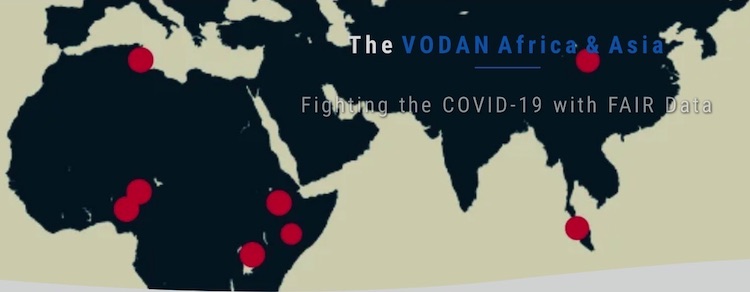By Reinhard Jacobsen
BRUSSELS (IDN) — The United Nations has commended VODAN-AFRICA for their innovative approach to “data sharing and re-use under the present COVID-19 circumstances”. The Virus Outbreak Data Network is a system of sharing data on Coronavirus that ensures that the information remains in the country that generated it, rather than being exported and unavailable to local doctors and scientists.
The network includes computer scientists and health data management experts, clinicians and social scientists from all of the participating countries. Presently, these include Uganda, Kenya, Ethiopia, Nigeria, Tunisia, Liberia and Zimbabwe. FRENCH | GERMAN | JAPANESE | TAGALOG
The UN’s specialised agency, the United Nations Educational, Scientific and Cultural Organization (UNESCO) in a report titled Engineering for Sustainable Development: Delivering on the Sustainable Development Goals, published on March 3, mentions VODAN-AFRICA as a technical innovation for COVID-19 pandemic data:
“For instance, the principles underlying research at the Kampala International University in Uganda, centre around ‘collaboration within context’, bolstering its lead in the multi-country Virus Outbreak Data Network to manage African COVID-19 pandemic data within the precepts of data sovereignty.”
Professor Mirjam van Reisen, VODAN’s global coordinator and a lead researcher of the programme from Leiden University Medical Centre (LUMC), is happy at the recognition by UNESCO.
“VODAN-Africa was established a year ago when the COVID-19 crisis was declared as a global pandemic. The background was the experience of Ebola data from the crisis in Liberia. Today the Ministry of Health in Liberia does not have a complete set of these data.”
Van Reisen says the experience in Africa is that health data leave the continent and do not return. Without a benefit to those data, there is little appetite on the continent to share data. “VODAN-AFRICA has solved that.”
Data are reposited in residence. The data can only be visited—depending on whatever access is granted. All privacy and security of the data is respected according to the highest standard of the GDPR.
Queries can be executed over the data, and therefore this data can contribute to the understanding of COVID-19 on the African continent.
VODAN-AFRICA provides a dashboard of real-life data within the clinic which is also where the data is stored. The real-time dashboard is realised as data is machine-readable. This technology is provided as the new smart technology that will help revolutionize health care. In addition, aggregate data queries can be executed if and when clinics approve, and under the guidelines of their respective Ministries of Health.
Just two weeks earlier, the World Health Organization (WHO) proposed the future of health data to be adopted to be SMART, with a focus of the benefit of these data to improve quality of health.
SMART stands for Standards-based, Machine-readable, Adaptive, Requirements-based, and Testable. The SMART Guideline approach includes documentation, procedures, and digital health tools, introduced in a new comment published in The Lancet Digital Health.
WHO envisions a future where everyone in the world benefits fully and immediately from clinical, public health, and data-use recommendations. SMART Guidelines are a new approach to systematize and accelerate the consistent application of recommended, life-saving interventions in the digital age.
Its importance lies in the fact that WHO guidelines articulate and endorse rigorously tested recommendations for health interventions to be adopted within country programs. “When applied correctly and consistently, guideline recommendations save lives,” says WHO.
“In this day and age, the rigorous process of developing WHO guidance is only one part of improving health outcomes for people around the world,” said Dr Soumya Swaminathan, WHO Chief Scientist.
“Recommendations become meaningful when they are lifted off the page and effectively applied to local systems at the country level; when they are aligned with an evolving evidence base. SMART Guidelines are a pioneering approach to digital health systems transformation.”
The VODAN-AFRICA project is led by Kampala International University (KIU) in Uganda, and Prof Francisca Oladipo is executive coordinator of VODAN-AFRICA and a member of the Pan African Academy of Sciences.
Professor Oladipo says: “Since COVID-19 we have realised we can work easily over zoom with experts from all over the continent. We collaborate with 12 universities across the continent to enhance our capacities and that of our students. We meet every week with 40 experts on zoom. This programme has shown that collectively we can achieve critical innovation for the continent, and we are proud of it.”
To take further advantage of the digitalisation on the continent, the team has also developed on-line learning curricula to ensure the innovation will be supported by sufficient expertise and will generate employment on the continent. The on-line curricula will be freely available to support teachers and students at the Digital Learning Platform of Kampala International University.
“In Africa, we are making the switch to digital health and education”, says Professor Oladipo “and our youth is to benefit from their inclusion in the digital economy. We are happy to see the acclaim of the programmes and are determined to make impact that will benefit the people of our continent.” [IDN-InDepthNews – 12 March 2021]
Image: VODAN-AFRICA




